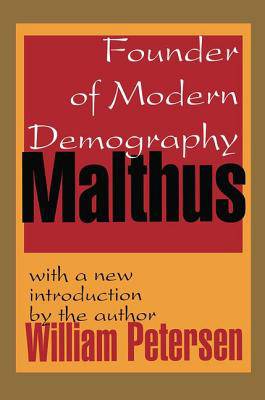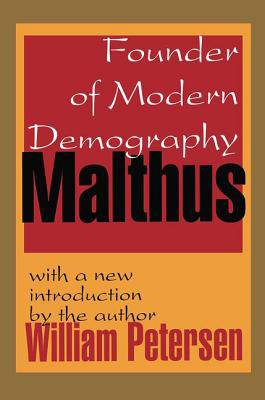
- Afhalen na 1 uur in een winkel met voorraad
- Gratis thuislevering in België vanaf € 30
- Ruim aanbod met 7 miljoen producten
- Afhalen na 1 uur in een winkel met voorraad
- Gratis thuislevering in België vanaf € 30
- Ruim aanbod met 7 miljoen producten
Zoeken
Omschrijving
Thomas Robert Malthus (1766-1834), one of the most influential of modern thinkers, is also one of the most misunderstood. Malthus' Essay on Population is a work that everyone cites but typically without having read it. This book offers a comprehensive and accurate exposition of his thought, integrating his better-known theory on population with his somewhat neglected analysis of economic development and social structure.
In Petersen's Malthus both the general reader and the social scientist are given a basis for contrasting Malthus with competing theories. As a background to his exposition, Petersen discusses the trends since Malthus' day in fertility, mortality, and population growth. The book also has an accessible comparison of Malthus' economics with that of his contemporary, David Ricardo, as well as the links to the Keynesian thought of recent time. Petersen also comments on Malthus' stand on birth control, as well as on the rise of the neo-Malthusian movement and its successor in today's less developed countries. The review of both population trends and demographic theory over the past century and a half gives the reader a base from which he can judge in what respects Malthus did, or did not, forecast the future accurately. As Petersen points out, Malthus also influenced the evolutionary theory of Charles Darwin, as well as its offshoot, Social Darwinism. Malthus is an essential work not only for demographers and economists but for anyone interested in intellectual history. The late Robert Nisbet, in his review of the book for the New Republic, called it "the best exposition of Malthus to be found anywhere." William Petersen, Robert Lazarus Professor of Social Demography Emeritus at Ohio State University, is known throughout the profession as a leading demographer. He is also an elegant writer.Specificaties
Betrokkenen
- Auteur(s):
- Uitgeverij:
Inhoud
- Aantal bladzijden:
- 302
- Taal:
- Engels
Eigenschappen
- Productcode (EAN):
- 9781138527515
- Verschijningsdatum:
- 4/04/2018
- Uitvoering:
- Hardcover
- Formaat:
- Genaaid
- Afmetingen:
- 152 mm x 229 mm
- Gewicht:
- 769 g

Alleen bij Standaard Boekhandel
+ 391 punten op je klantenkaart van Standaard Boekhandel
Beoordelingen
We publiceren alleen reviews die voldoen aan de voorwaarden voor reviews. Bekijk onze voorwaarden voor reviews.











